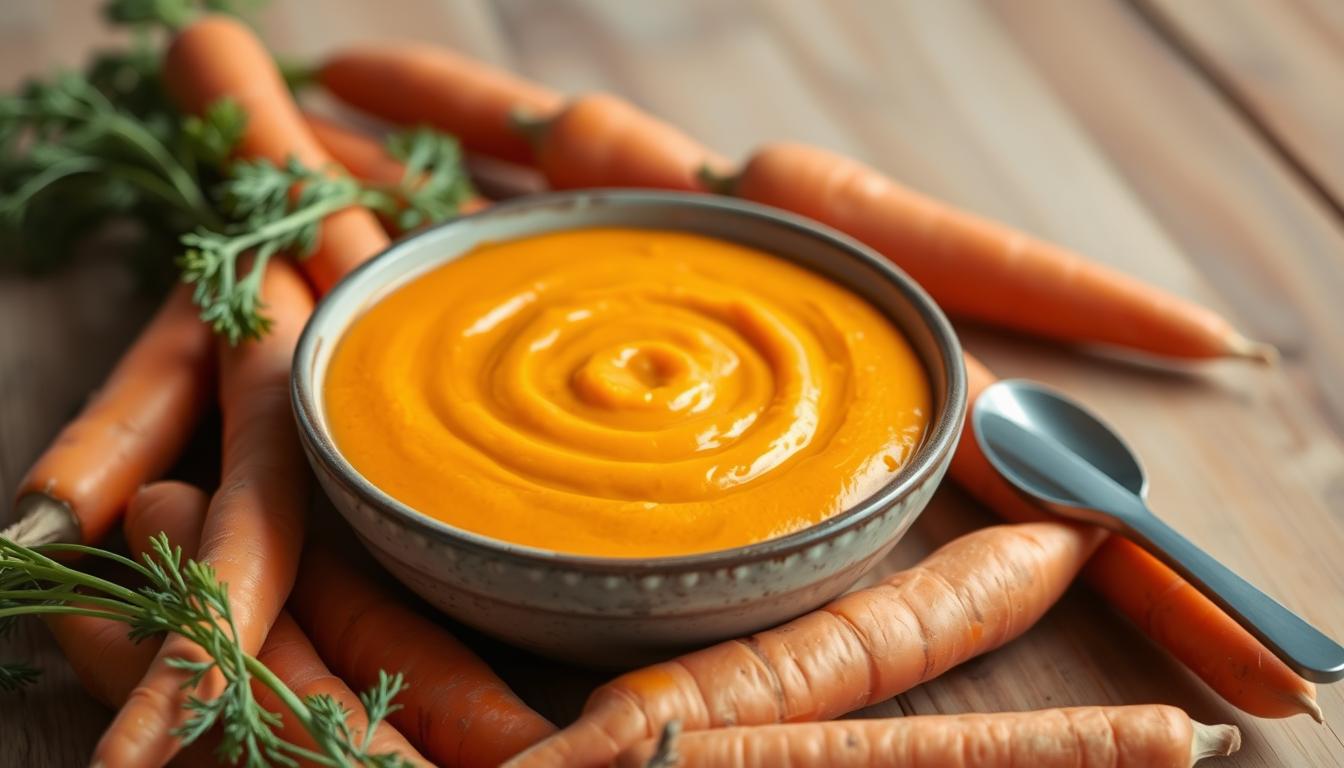Starting your baby on solid foods is both thrilling and nerve-wracking. Carrot Puree for Infants is a top pick for new parents. It’s bright orange and sweet, making it a hit with babies. Plus, it’s packed with nutrients that help your baby grow strong and smart.
Making carrot puree at home is easy and fulfilling. It lets you control what your baby eats. Learning to make Carrot Puree for Infants is a great way to kick off your baby’s food journey. Let’s dive into the world of carrot puree and see how it can be a key part of your baby’s diet.
Table of Contents
Understanding the Benefits of Carrot Puree for Babies
Carrots are a nutritional powerhouse that make an excellent first food for infants. They are rich in vitamin A, which promotes healthy eyes and a strong immune system. Carrots also contain beta-carotene, fiber, and antioxidants, providing a range of benefits for growing babies.
Essential Nutrients in Carrots
Carrots are packed with essential vitamins and minerals that are vital for an infant’s development. They are an excellent source of vitamin A, with 100 grams containing around 835 mcg of this vital nutrient. Carrots also provide vitamin C, potassium, fiber, and natural sugars, making them a well-rounded addition to a baby’s diet.
Key Health Benefits for Growing Infants
- Supports immune system function by boosting lymphocytes and blood platelets
- Promotes healthy eyesight and retinal development
- Aids liver function and protects against harmful chemicals
- Improves heart and kidney health through flavonoids
Why Carrots Make an Ideal First Food
Carrots are a popular first food for infants due to their natural sweetness and smooth, creamy texture. Babies aged 6 to 12 months need about 500 mcg of vitamin A daily, and carrots are an excellent source of this essential nutrient. Regular orange carrots are recommended for making carrot puree, as they are more nutritious than baby carrots.
“Carrots can be fed to infants from six months old when properly prepared.”
When to Introduce Carrot Puree to Your Baby
Carrots are safe for babies as young as 6 months. But, always check with your pediatrician before starting solid foods. This is because every baby is different and ready at their own pace. Start with a little carrot puree to watch for any allergies.
Cooked and pureed carrots are best for babies. They are easier to digest than raw carrots. Babies under 3 months should not have carrots because of their nitrate content.
Introducing solids slowly is key. It helps your baby’s stomach get used to new tastes and textures. Your pediatrician will guide you, making sure your baby’s transition to solid foods is smooth and safe.
“Introducing solid foods should be a gradual process, taking cues from your baby’s signals and preferences.”
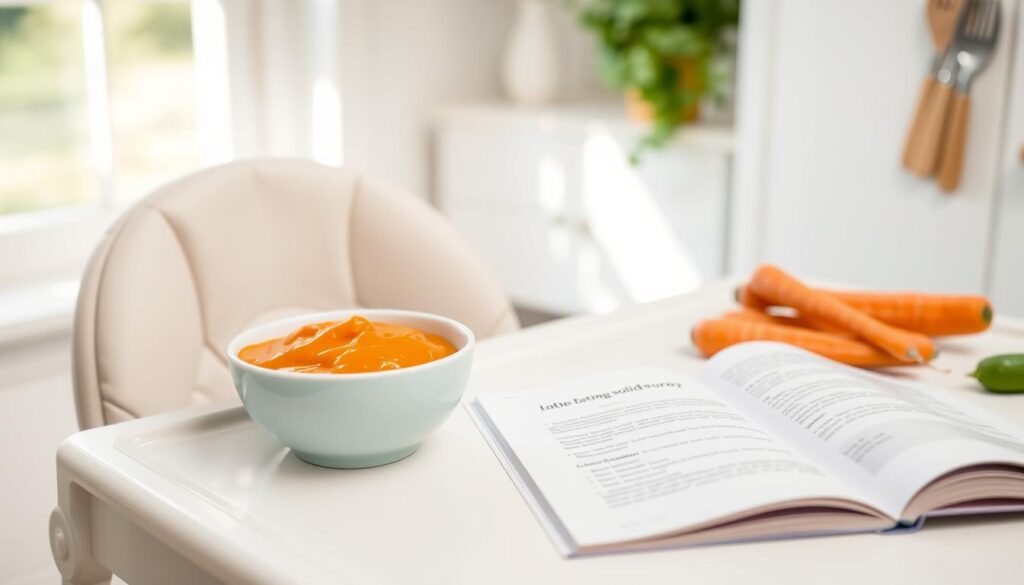
Start with a small amount of carrot puree and watch your baby’s reaction. As they get used to it, you can give them more. With patience and care, your baby will enjoy a tasty and healthy journey of trying new foods.
Selecting and Preparing Carrots for Baby Food
Choosing the right carrots is key to making tasty and healthy carrot puree for your baby. Look for fresh, full-grown carrots with a bright orange color and few blemishes. Organic carrots are better because they have less nitrates than non-organic ones.
Choosing the Right Type of Carrots
Baby-cut carrots might seem easy, but they’re often treated with chlorine. They also might not be as nutritious. Instead, pick whole, full-size carrots without any soft spots. These will taste better and be healthier for your baby.
Proper Cleaning and Storage Methods
After picking the best carrots, clean them well before making the puree. Start by soaking them in water to get rid of dirt. Then, rinse them under running water. Use a soft-bristled brush to gently scrub them clean.
Peel and chop the carrots after cleaning. Store them in an airtight container in the fridge for up to 3 days. This keeps the carrots fresh and full of nutrients for your baby’s puree.
| Best Carrots for Baby Food | Cleaning Carrots for Baby Puree | Storing Carrots for Baby Food |
|---|---|---|
|
|
|
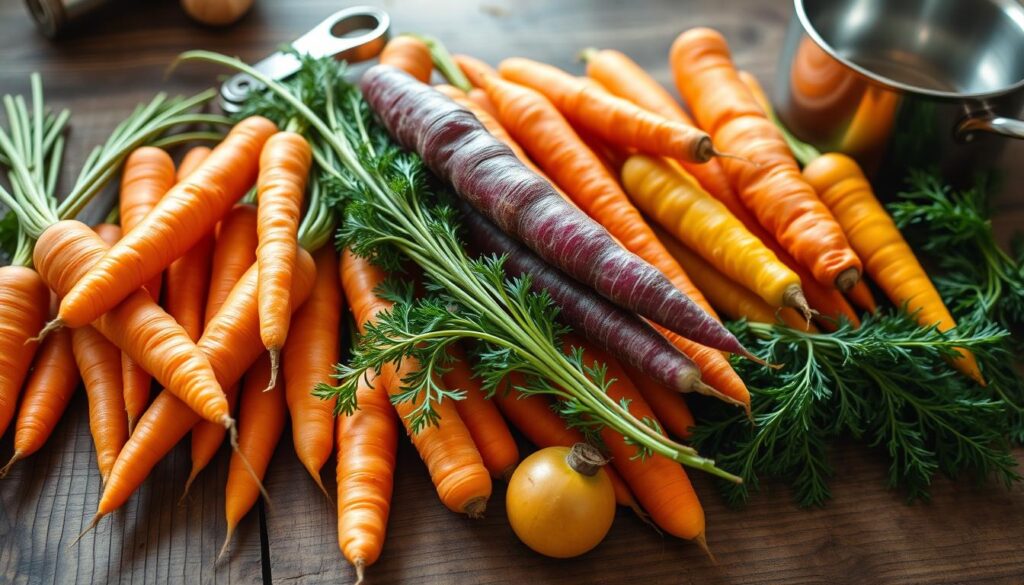
“Variety in vegetables helps to balance flavors and provide a range of nutrients to support your baby’s growth and development.”
Step-by-Step Guide to Making Carrot Puree for Infants
Are you ready to introduce your little one to homemade carrot baby food? Making carrot puree is easy and nutritious. Follow this guide to make a homemade carrot baby food your child will enjoy.
- Choose fresh, high-quality carrots. Look for firm, blemish-free, and vibrant carrots.
- Wash the carrots well and peel them. This removes dirt and ensures a smooth texture.
- Cut the peeled carrots into 2-inch chunks for even cooking.
- Steam the carrot chunks for about 20 minutes, until they’re tender.
- Transfer the cooked carrots to a blender or food processor. Add a bit of steaming liquid if needed.
- Blend the carrots until they’re smooth and creamy. Adjust the consistency as needed.
- For extra nutrition and flavor, add a teaspoon of olive oil. You can also mix it with other baby food ingredients.
Congratulations! You’ve made a delicious and nutritious carrot baby food recipe. Always check with your pediatrician before introducing new foods. Start with small portions for your baby’s comfort and safety.
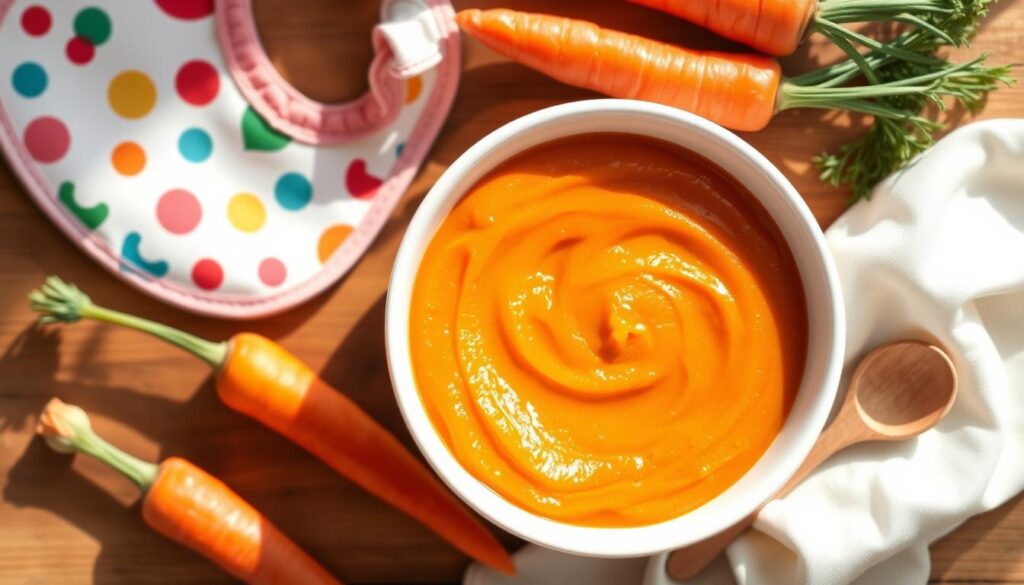
Best Cooking Methods for Baby’s Carrots
Choosing the right cooking method for carrots is key for your baby’s first foods. Steaming and boiling are top choices for a smooth, easy-to-digest puree. These methods help keep the carrots’ nutrients and texture just right for your little one.
Steaming vs. Boiling Methods
Steaming is the best way to cook carrots for baby food. It keeps more of the vitamins and minerals in the carrots. To steam, put peeled and sliced carrots in a steamer basket over boiling water. Let them cook for 10-20 minutes until they’re tender.
Boiling is another option, but it might lose some nutrients. To boil carrots, cover the chopped pieces with water and cook for 20 minutes. They should be soft enough to mash or puree.
Temperature and Timing Guidelines
It’s important to cook carrots until they’re soft and mashable. Steaming takes 10-20 minutes, while boiling might take 20 minutes or more. The goal is a smooth, creamy puree that’s safe and easy for your baby to digest.
Carrots make a great first food for babies. They’re packed with vitamins, minerals, and sweetness that your baby will enjoy.
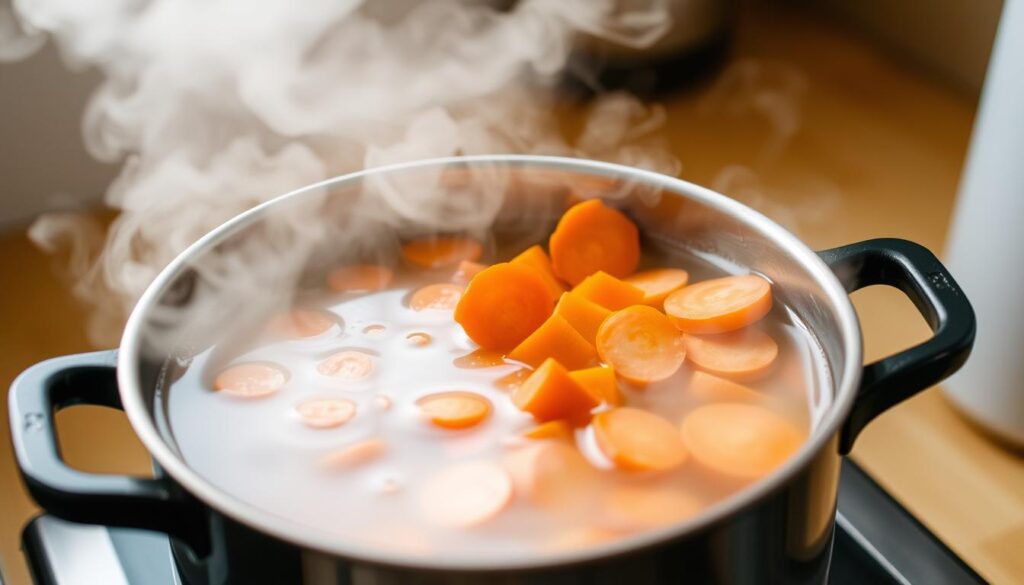
Storage Tips and Food Safety Guidelines
Keeping your homemade carrot puree fresh and safe is key for your baby’s health. You can store it in the fridge for up to 5 days. For longer storage, freeze it in ice cube trays or small containers for up to 3 months.
To serve frozen puree, thaw it in the fridge or warm it gently in the microwave. Always check the temperature before feeding to avoid any hot spots that could burn your baby’s delicate mouth. Discard any leftover puree that has come into contact with your baby’s saliva, as it can introduce harmful bacteria.
| Storage Method | Maximum Storage Time |
|---|---|
| Refrigerator | 5 days |
| Freezer | 3 months |
By following these simple tips, your homemade carrot puree will stay fresh and safe for your baby. Proper food handling and storage are essential for a healthy start in life.
“Homemade pureed food can be stored in the freezer for 2-3 months and is up to 45% cheaper than store-bought options.”
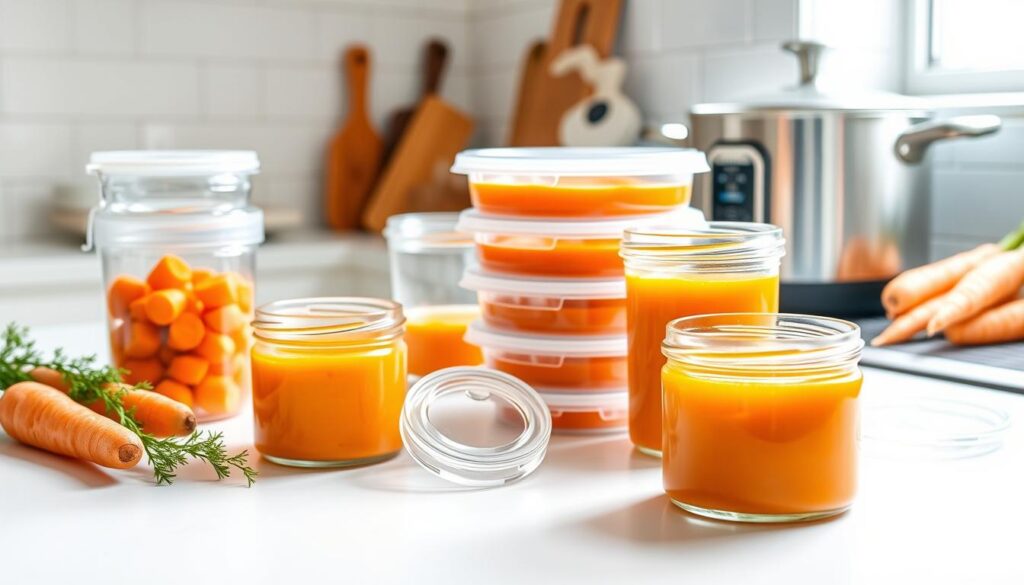
Creative Carrot Puree Combinations and Recipes
Explore a world of flavors and nutrition with carrot puree combinations. You can mix and match to create tasty and healthy meals for your baby. This way, you can introduce new tastes and textures that excite their growing palate.
Mixing with Other Vegetables
Try mixing carrot puree with sweet potatoes, peas, or spinach. These combinations offer a variety of vitamins and minerals. They also introduce new flavors and textures to your baby’s meals.
The sweetness of carrots goes well with sweet potatoes or spinach. This mix creates a delicious blend that your baby will love.
Fruit and Carrot Combinations
Add a touch of sweetness by mixing carrot puree with apples, pears, or peaches. These combinations offer a great balance of flavors and essential nutrients. You can also add a pinch of cinnamon or ginger for extra depth.
For more protein, blend carrot puree with Greek yogurt or silken tofu. This adds a nutritious twist to your baby’s meals. It works well in both savory and sweet dishes, ensuring a balanced and healthy meal.
Always introduce new foods one at a time. This helps you spot any allergies or sensitivities. With a bit of creativity, you can make healthy and tasty carrot puree combinations that your baby will enjoy.
Common Mistakes to Avoid When Making Carrot Puree
When making carrot puree for your baby, it’s important to avoid common mistakes. This ensures a safe, nutritious, and enjoyable meal. Here are some mistakes to avoid:
- Avoid using baby carrots or pre-cut carrots: These carrots may have been treated with chlorine, which is harmful. Choose fresh, whole carrots instead.
- Don’t add salt, sugar, or honey: Your baby’s digestive system can’t handle these additives. Stick to the natural goodness of carrots.
- Ensure proper cooking to reduce nitrate levels: Overcooking carrots can increase nitrates, which are bad for infants. Follow the recommended cooking methods.
- Avoid overfeeding: Start with small portions and increase as your baby’s appetite grows. Overfeeding can cause discomfort.
- Don’t introduce multiple new foods at once: Introduce one new food at a time to watch for allergic reactions.
Always talk to your pediatrician before starting your baby on solid foods. This is important if you have concerns about allergies or intolerances. By following these tips, you can make sure your baby’s carrot puree is safe, nutritious, and delicious.
| Statistic | Value |
|---|---|
| Annabel Karmel has written over 40 books on feeding children. | 40+ |
| Advice has shifted over the years regarding allergens, with a recommendation now to introduce allergens to children early to desensitize them. | Shift in advice |
| There has been a transition from purees to more baby-led weaning. | Transition to baby-led weaning |
| Gagging is a natural reflex for babies, causing anxiety for parents. | Gagging reflex in babies |
| Iron deficiency is a concern for many babies, with a recommendation to introduce iron-rich foods twice a day. | Iron deficiency concern, introduce iron-rich foods 2x/day |
| Oily fish is suggested twice a week for essential fatty acids. | Oily fish 2x/week |
| Starting weaning with bitter green vegetables is a new suggestion but may not work for all babies. | Bitter green vegetables for weaning might not be suitable for every baby. |
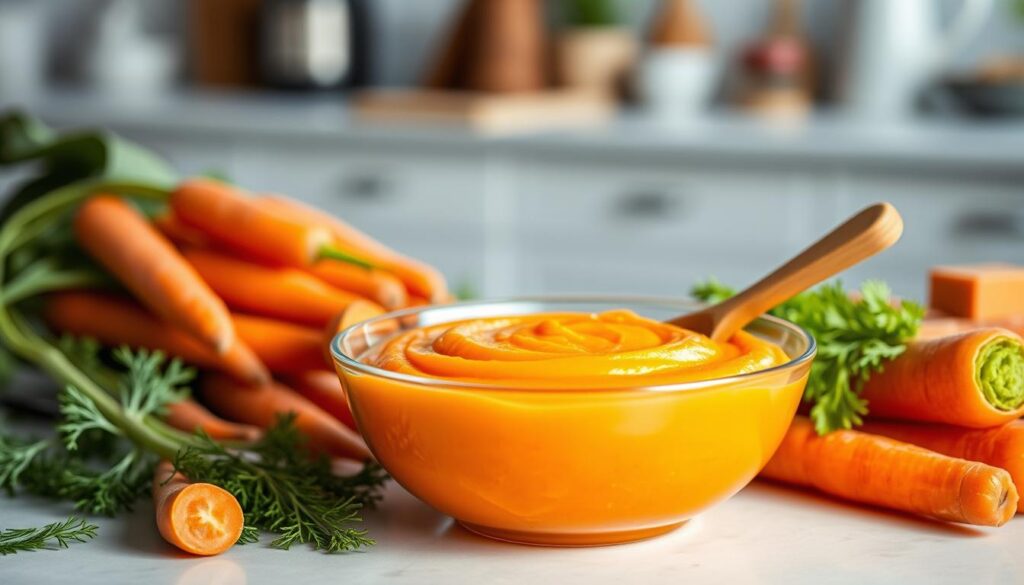
The key to a successful carrot puree journey is to take it at your baby’s pace. Enjoy the process. By avoiding these mistakes and focusing on food safety, your baby will enjoy homemade carrot puree.
Conclusion
Carrot puree is packed with nutrients, making it a great first food for babies. It’s full of vitamins, minerals, and antioxidants. This homemade baby food supports your baby’s growth and health.
When you make carrot puree, follow the right steps to keep it safe. This guide helps you do just that. You can then introduce this healthy food to your baby’s diet.
Carrot puree does more than just feed your baby. It helps them learn to like new foods and tastes. Consult your doctor before introducing solid foods. Also, introduce new foods one at a time to watch for allergies.
Carrot puree is a tasty and healthy choice for your baby’s meals. Making it yourself is rewarding. You get to see your baby enjoy the delicious taste of carrot puree.
FAQ
What are the benefits of carrot puree for infants?
When can I introduce carrot puree to my baby?
How do I prepare carrot puree for my baby?
How should I store homemade carrot puree?
What are some creative ways to serve carrot puree to my baby?
Are there any mistakes I should avoid when making carrot puree for my baby?
Source Links
- Puree for Babies
- What is the flavour window? How to help your baby enjoy new foods
- Carrot For Babies: 11+ Nutritious And Easy-To-Make Recipes
- Simple Carrot Puree (for babies and adults)
- Carrot for Babies – When to Introduce, Benefits and Recipes
- HiPP Carrots and Potatoes with Lamb Meat Puree 190g (6123)
- 6 Months Old Baby Food Chart
- 5 Best Vegetables for Babies
- Chicken for Babies: A Complete Guide With Recipes + Baby-Led Weaning
- Roasted carrots over Cannellini and hazelnut purée
- Cheddar and Carrot Mac and Cheese – Slender Kitchen
- Easy Roasted Carrots
- Healthy Homemade Pureed Meals for Kids: A Detailed Guide – Richmond Mom
- Quick & Easy Baby Puree Recipes You Can Make in Under 12 Minutes
- 11 Healthy And Easy Carrot Recipes For Kids
- Best Food Recipes 2025
- How to Sneak Vegetables (and Fruit) into Kids’ Food
- Annabel Karmel’s top 5 weaning tips
- Effect of the Storage Conditions on the Microbiological Quality and Selected Bioactive Compound Content in Fruit Mousses for Infants and Young Children
- 15 Best Finger Foods For Babies
- Physicochemical Factors Affecting the Rheology and Stability of Peach Puree Dispersions
